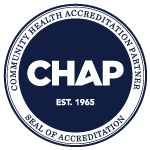Pueblo Service Area has nearly 200 volunteers who donate precious time to the needs of our organization. Volunteers are sometimes referred to as “The Heart of Hospice”. Last year volunteers provided nearly 20,792 hours to hospice care needs.
Volunteer Facts:
- Sangre de Cristo Hospice is a Non-Profit Organization and is required to prove 5% of volunteer hours, compared to number of paid staff hours for direct patient care.
Volunteer Service Categories:
- Direct Patient Care – NH-HH or patient homes
- Administration/Office Support – all locations
- Spiritual Support – NH-HH or patient homes
- Eleventh Hour – sitting with actively dying patients – NH-HH or patient homes
- General Support – includes fund raising or other contributions to hospice care that define SdCH as going above-and-beyond the needs of our patients.
- Pet Peace of Mind – support given to patients who have pets with needs
- Complimentary Therapies – Part of a program that provides comfort and care to patients, caregivers. Complementary therapies complement traditional medical treatment to ease pain, control symptoms, and increase quality of life. These therapies are integral and have become a standard of practice within the holistic model for patients care. These include: Touch Therapy, Eleventh Hour, Soothing Sounds, Pet Therapy, Story Telling and Music Therapy.
Volunteers do not receive monetary compensation for their work, but they reap substantial emotional awards from contributing their time and efforts. Working with ill patients, especially terminally ill patients, creates a nourishing bond between the patient and the volunteer. This bond can be one of the most meaningful relationships a patient has as she nears the end of her life. The American Academy of Family Physicians defines a hospice as “a program designed to care for the dying and their special needs: A hospice addresses patients’ physical and emotional needs.” This care may be provided in an actual facility or within the patient’s home. Hospice volunteers are individuals who volunteer their time and talents to support a more humane system of care for the dying patient and their family members.
Considerations: A hospice volunteer is not obligated to work directly with patients. Working directly with individuals nearing the end of their lives may be too emotionally taxing for some individuals. Therefore those who wish to volunteer without being directly involved with patients may perform administrative or fundraising work. Already having or having the ability to learn clerical skills should equip the volunteer to successfully complete this sort of work.
Preferred Qualifications:
Hospice volunteers should be patient, compassionate, open minded, dependable, mature and understanding.
Volunteers should also have excellent communication skills and respect for patients’ privacy.
Hospice volunteers must be familiar with the goals and practices of the specific hospice for which they are volunteering and pass a background check.
Hospices are very cautious in accepting volunteers who have experienced the loss of loved ones within the past year. Waiting periods may vary, but are a common practice to ensure that volunteers can emotionally handle their responsibilities.


